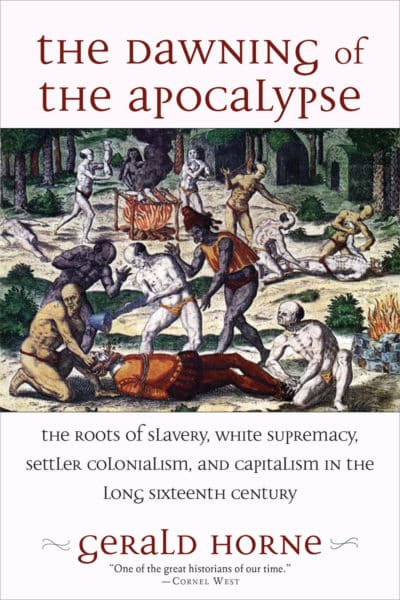The Immanent Frame, published by the Social Science Research Council, recently launched a series titled “Unveiling the end times: Neoliberalism and Apocalypse.” Through a series of paired conversations, conversants address questions such as: What is ending in apocalypse? How do people enter into or prepare for the end of the world? Who is rejoicing as the world ends? In what ways are the end times precipitated by neoliberalism? Gerald Horne, author of The Dawning of the Apocalypse, among several other books published by Monthly Review Press, was recently interviewed for this series by Charisse Burden-Stelly. Burden-Stelly co-authored, with Horne, W. E. B. Du Bois: A Life in American History, and not so long ago wrote the article “Modern U.S. Racial Capitalism,” for Monthly Review. Their conversation was entitled “The longue durée of apocalypse.”
Charisse Burden-Stelly: “….apocalypse represented, for African and indigenous folks, the end of life as they knew it—that is, a life free from enslavement, genocide, and ongoing violence wrought by the insatiable drive of the group that came to be known as “whites” for endless profit. This ending was simultaneously the beginning of a capitalist world economy rooted in racial hierarchy, imperial domination, and militarized social relations, of which neoliberalism is merely the most recent enunciation.”
Gerald Horne: “Allow me to deploy (The Dawning of the Apocalypse) as my jumping off point to explore the roots of neoliberalism. To wit, post-1492 Spain, which sponsored Columbus, had first mover’s advantage as this new stage in history unfolded. However, though it was barely glimpsed at the time, that advantage began to erode in 1517 when Martin Luther led his secession from Catholicism. For various reasons this departure was followed in London by the 1530s, igniting decades of intense religious conflict between Protestants and Catholics. London, the scrappy underdog, resorted to desperate measures. When the Catholics were expropriated, part of the proceeds were shipped eastward to Madrid’s foe, the Ottoman Turks, who, in 1453, had sparked fear and loathing in Christendom by imposing Muslim rule on what is now Istanbul.
1492 also marked the concluding ouster of Muslims from Spain itself, though the legacy of the Muslim presence continued to haunt. This pivotal year also marked the acceleration of the Inquisition and the ouster of the Sephardim from Spain, who fled not only east to Turkey but also to Holland—and England itself. The latter site was ironic in that London had expelled its own Jewish population two centuries earlier. England had welcomed this fleeing minority under the gun and then was able to take advantage of diaspora networks in the ongoing contestation with the Catholic powers.
Still, in terms of the rise of neoliberalism and capitalism, a hinge moment arrives in 1591 when London aligns with predominantly Muslim Morocco in subduing the Songhay Empire, a potent polity not far distant from today’s Mali, which catalyzed the onrushing African Slave Trade, as this destabilization ricocheted and cascaded as far south as today’s Nigeria.
Then as detailed in my earlier book, The Apocalypse of Settler Colonialism, after the beheading of the monarch in London, there arose Oliver Cromwell and the republican surge that was punctuated by the seizure of Jamaica in 1655. Simultaneously, the Portuguese were making a comeback in Brazil from which they had been ousted. This comeback caused Jewish planters, who had pioneered in the process of producing sugar from enslaved labor, to seek other climes due to justifiable fear of the arrival of the Inquisition by a Lisbon regime heavily influenced by Madrid. This minority fled then to Jamaica bringing their capital and skills with them, helping to ignite the sugar boom in Jamaica and Barbados and nearby islands, pouring enhanced revenues into the coffers of London. This migration, in a sense, plants the seeds of what is to emerge as capitalism, as these revenues allow for the building of more vessels, which allowed for the transplanting of more settlers westward and more slave ships southward in search of more enslaved laborers. This also increased the number of wage laborers in England, with more money to spend, creating a kind of circle of prosperity—for some.
By 1672 London had moved under the thumb of the restored monarch to systematize the African Slave Trade, which provided the initial impetus for capitalism by forming the Royal African Company. By 1683 external pressure was reduced on Western European Christendom when the Ottoman Turks were stopped at the gates of Vienna, which was followed in 1688 by the so-called “Glorious Revolution” in England, when the merchants elbowed their way into the ludicrously lucrative African Slave Trade.
In some ways, one of the earliest expressions of neoliberalism occurs, then, when the process of “Free Trade in Africans” and the acceleration of “market forces” in this odious commerce takes off like a rocket. In sum, merchants descend en masse on Africa with the manic energy of crazed bees, handcuffing and manacling every African in sight, dragging them across the Atlantic where they produced even more wealth, fattening purses of investors.”
Read the rest of the interview at The Immanent Frame
Gerald Horne is author of The Dawning of the Apocalypse: The Roots of Slavery, White Supremacy, Settler Colonialism, and Capitalism in the Long Sixteenth Century, The Apocalypse of Settler Colonialism: The Roots of Slavery, White Supremacy, and Capitalism in Seventeenth-Century North America and the Caribbean, Jazz and Justice: Racism and the Political Economy of the Music, and Confronting Black Jacobins: The United States, the Haitian Revolution, and the Origins of the Dominican Republic, all published by Monthly Review Press.


Comments are closed.